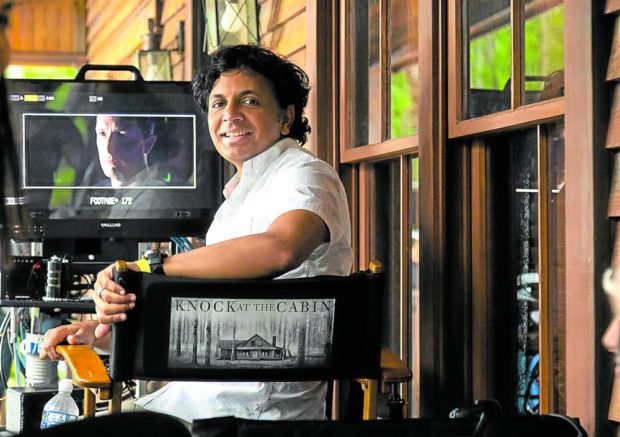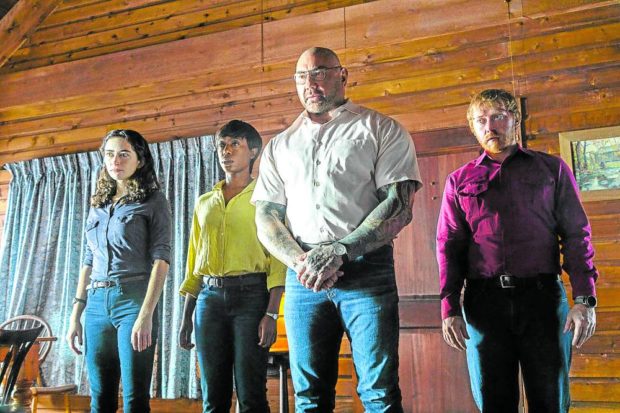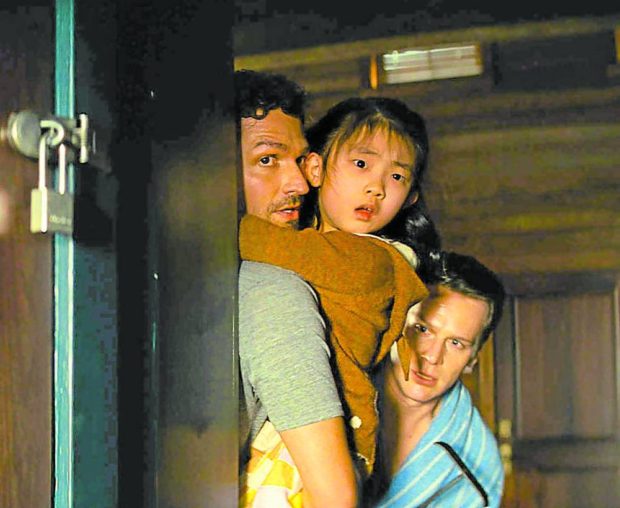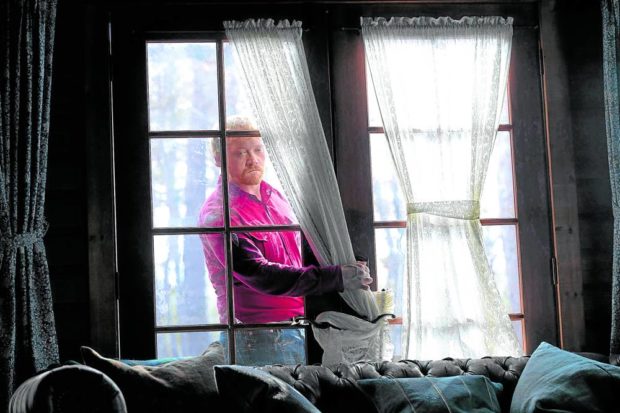M. Night Shyamalan on his obsession with the end of the world

Director M. Night Shyamalan on the set of “Knock at the Cabin.” (Photo courtesy of Universal Pictures International)
Since he began churning out scary films with creepier twists in 1999’s “The Sixth Sense,” director M. Night Shyamalan’s productions have amassed a cumulative gross of more than $3.4 billion dollars at the global box office. That’s no easy feat even for someone who had made 45 home movies before he turned 17.
Now 52 years old, and with blockbusters like “Unbreakable,” “Signs,” “The Village,” “The Visit,” “Split,” “Glass” and “Old” tucked snugly under his belt, the Indian-American filmmaker isn’t about to rest on his laurels.
In his latest apocalyptic drama “Knock at the Cabin,” which opened in Philippine cinemas yesterday, Shyamalan is putting a contemporary spin on the tale of the Four Horsemen of the Apocalypse by adapting Paul Tremblay’s 2018 novel “The Cabin at the End of the World.”
Alas, even the Bram Stoker Award-winning book has succumbed to Shyamalan’s penchant for turning the narrative on its head.
In the film, a gay couple, Eric (Jonathan Groff of “Hamilton”) and Andrew (Ben Aldridge of “Pennyworth”), and their 7-year-old adopted daughter Wen (Kristen Cui) are taken hostage while vacationing in a remote cabin by four armed strangers who are haunted by terrifying visions.
Article continues after this advertisementThe trio’s captors, composed of second-grade teacher Leonard (Dave Bautista), contractor Redmond (Rupert Grint), post-op nurse Sabrina (Nikki Amuka-Bird), and restaurant cook Adrianne (Abby Quinn), demand that they make an unthinkable choice to avert the impending apocalypse: kill one of their own as a sacrifice! It’s hard to imagine a trickier Solomonic dilemma than that.
Article continues after this advertisementWhen we spoke to the Oscar-nominated director last Monday, he explained to us his obsession with the end of the world.“It’s like adding pressure to an already tense situation,” Shyamalan quipped, laughing. “I guess the movies that I love—like, I have posters of George Romero’s ‘Night of the Living Dead’ and Alfred Hitchcock’s ‘The Birds’ up on a wall in my house—examine events as seen through the eyes of very few people.
“It’s funny that you mention this because right now, I am mulling over ideas for my next three movies, and one of them features another ‘end of the world’ scenario (laughs). I won’t tell you what it’s about, but I’ll tell you that I’m still obsessed by it. And I assure you that you’re going to love it.
“Why am I drawn to it? It isn’t really the ‘end of the world’ part that’s of interest to me, but our response to it. It ties us together in a way that’s quite beautiful. It’s moments when the family is connected that the idea feels touching to me.”

The four strangers (from left): Abby Quinn, Nikki Amuka-Bird, Dave Bautista, and Grint. (Photo courtesy of Universal Pictures International)
Finding the right balance
Since it’s been 24 years since the release of “The Sixth Sense,” his breakout film, we asked the filmmaker to describe the evolution of his fascination with the supernatural, the macabre and the twisted.
“You know, when I get to talk to journalists like you about my films, I learn something about myself. It’s almost like you’re my therapist… because you’re very good at just letting me talk my feelings out (laughs). And this made me realize that, inherently, I’m a very emotional and sentimental guy.
“My first two movies, which I did when I was 21 (the drama ‘Praying with Anger’) and 24 (the comedy-drama ‘Wide Awake’), showed heart-on-sleeve emotions, but I couldn’t talk to the audiences properly for some reason, because I was only showing light and love and sentimentality.
“So when I decided to go into [the horror] genre for my third movie (‘The Sixth Sense’) at 26 or 27, that’s when I had the darkness that evened out the light… and that’s when I found the right balance.
“The audience could see that I could do very emotional stories and show, like in ‘The Sixth Sense,’ a mother and her son talking in a car, with the latter telling his mom that her own mother was still around and was very proud of her—things like that. It’s super emotional, but it’s balanced against the genre.
“And I’m able to deal with darkness now. I love that side of me… the dark things that balance out all of the optimism that I genuinely feel. So, that has stayed with me all these years since ‘The Sixth Sense,’ because it matches my personality. And it enables me to talk to you in a more powerful way.”

From left: Ben Aldridge, Kristen Cui, and Jonathan Groff. (Photo courtesy of Universal Pictures International)
Our Q&A with Shyamalan:
“Knock at the Cabin” is one of the few times in your career that you’ve adapted from existing source material. How do you choose which part of it to stay faithful to, and when do you put your own twist to the story?
It depends on the source material. “Stuart Little” was really the first adaptation that I did and, ultimately, I went from a straight adaptation of that book to making up a completely new thing. “Old,” my last movie in 2021, was based on a Swiss graphic novel. So, it was initially inspired by images, then I came up with a plot.
But “Knock’s” case, this was kind of a third version, inspired by the premise and setup of the novel. Then, the book takes a very sharp left turn.
I felt very strongly that that wasn’t the way the story should proceed. So, I changed the title of the movie as a signal to the audience that a decision has been made to make it a straight adaptation. Hopefully, people would want to go see what another artist did with the same premise.
As far as the changes I made, it isn’t really the ending that’s been changed—it’s the second half of the book. There’s a dramatic difference. For me, my fundamental position for the premise was that this family has to make a choice, and that’s where the pressure comes from.
Ultimately, I don’t care what their choice would be, they just have to make a choice, regardless of the reason behind it! You can’t have “Sophie’s Choice” and not have Sophie ever make a choice. For me, that’s the power of its premise.
It feels groundbreaking to see a mainstream film with a gay couple or an LGBT family at the center of it, although the movie’s marketing approach doesn’t really make a big deal of it. How much thought did you put into the fact that this has never been done before?
I feel really proud about this… because I didn’t really think about it in that way. The movie is just about family, and I relate to it very deeply as a love story. The protagonists’ genders are irrelevant to what this conversation is about.
In fact, of all the stories of love that I’ve told, it may be the love story that I relate to the most. This family’s love for each other or the couple’s deep love for their child is just a beautiful thing, making it very relatable on every level.
But thank you for saying that. Obviously, the people who have seen it so far have had a similar reaction to seeing themselves in this particular family. How beautiful is that, man? It’s awesome!

Rupert Grint. (Photo courtesy of Universal Pictures International)
What was the most difficult part of making this movie?
It had some of the easiest and hardest moments. The script was the easiest because the premise was so powerful that it just tumbled and tumbled as I was writing it to get to the end.
The hardest part was the storyboarding. I’m not sure if I could really articulate why, but I would guess that it was because it was shot in one location, and I was taking great pains to make sure that each scene was an evolution for the characters, visually… that I wasn’t just repeating something [that’s been done before].
For the movies that I’ve been making in the last eight or nine years, I’ve been holding myself to making smaller budget productions. However, I’ve held myself to an even higher standard of cinema. It’s this combination of things that are at odds with each other, so those were very, very hard shoots that we chose to do to get the look that you saw.
You don’t often work with the same actors over and over again, with the notable exception of Bruce Willis. Could you talk about your relationship with Rupert Grint, who’s probably the only English actor you’ve worked with multiple times now?
There’s an interesting thing that happens with actors and myself. The first time we work together, it’s kind of a good shock to them, especially with the way I think of cinema—I storyboard everything, and we rehearse scenes like a play. Also, the movement of the camera and the blocking are like choreography… so there’s an intense amount of pressure on them.
I’m also very character and emotion-driven when I’m directing. I see it as being part of something larger. So, sometimes, we become very successful because of that, as do the actors. And that’s when your relationship changes. But I never like chasing people around.
But in Rupert’s case, I did “Servant” with him for four years, and he’s just the loveliest and kindest man. I feel like there are so many colors that he hasn’t been given a chance to show yet. Same thing with Nikki, who acted in “Old.”
I knew that these individuals are in a balanced place, so it was easy to make that decision to bring them in. It was a case of them being not only the right actors for the roles, but it’s them being the right actors at the right time in their lives.